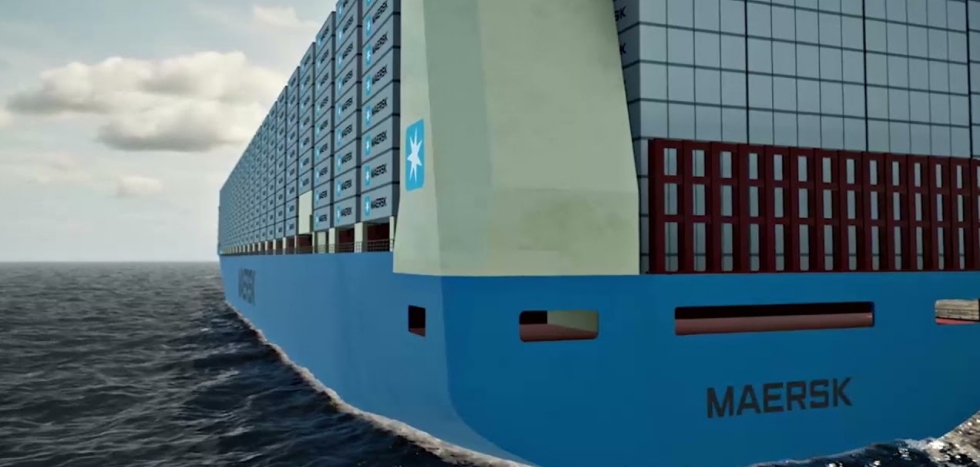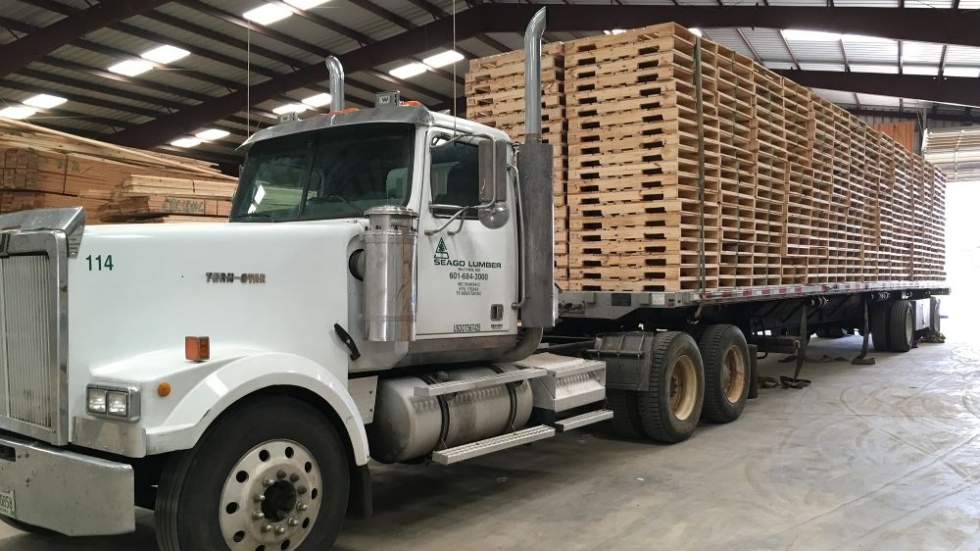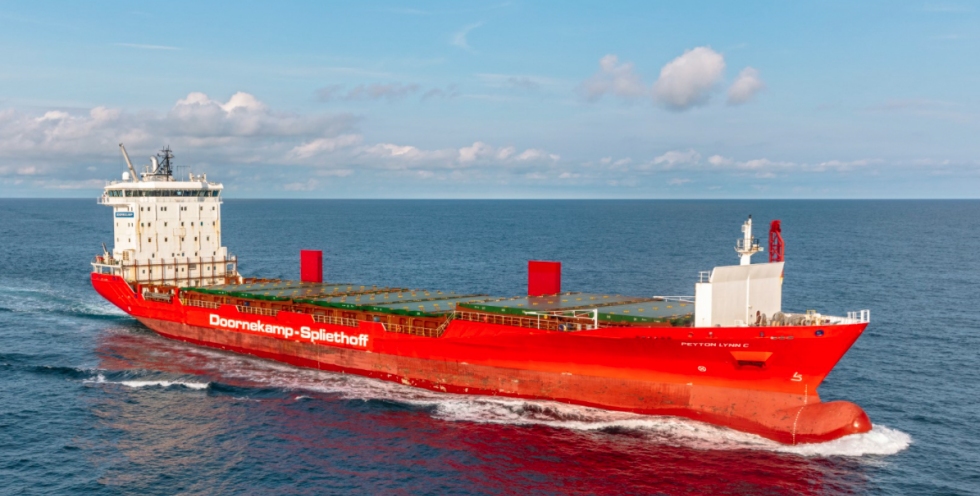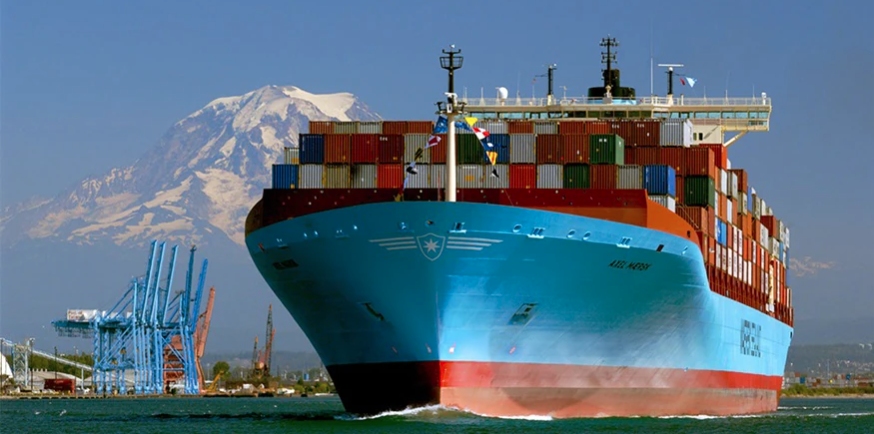|

Maersk, Proman Announce Agreement on Green Methanol Supply
March 10, 2022 (Press Release) - Proman and A.P. Moller -Maersk (Maersk) have entered into a new cooperation agreement to identify and develop green methanol supply solutions for Maersk's new methanol-fuelled container vessels.
As part of today's agreement, Proman will aim to supply Maersk with 100,000 – 150,000 tonnes per year of green methanol from its new 200,000 tonnes per year methanol facility in development in North America. The project will be built by Proman with target start of operations in 2025, producing bio-methanol from non-recyclable forestry residues and municipal solid waste.
Proman and Maersk will further collaborate on developing global projects with the aim of producing and delivering green methanol for Maersk's vessels. Proman will leverage its expertise across the methanol value chain to optimise global supply at Maersk's key bunkering ports, alongside wider collaboration and sharing of operational and technological best practices to drive forward shipping sustainability.
Proman is evaluating multiple bio-methanol and e-methanol projects in South America, Europe and the United Kingdom, which Maersk and Proman will explore as part of a longer-term green methanol supply strategy for Maersk and for the shipping industry.
Proman continues to develop worldwide investments in new ultra-low emission natural gas to methanol plants, in which plants are designed to maximise efficiency and minimise emissions, to help serve the broader marine fuel demand.
Proman Chief Executive, David Cassidy, said of the agreement: "Maersk's industry-leading commitment to green methanol is fully aligned with Proman's belief that methanol should be a key part of the energy transition. Methanol-powered vessels are already in use today, with a proven track record of reducing and even eliminating major emissions like particulate matter and sulphur oxides. We are excited to bring our deep industry experience to help deliver on Maersk's bold ambitions, working together to deliver green methanol and clean shipping at a global scale."
"To transition towards decarbonisation, we need a significant and timely acceleration in the production of green fuels. Green methanol is the only market-ready and scalable available solution today for shipping. Production must be increase through collaboration across the ecosystem and around the world. That is why these partnerships mark an important milestone to get the transition to green energy underway," says Henriette Hallberg Thygesen, CEO of Fleet & Strategic Brands, A.P. Moller – Maersk.
Key challenges remain in securing competitively priced green methanol globally. In order to help decarbonise the global shipping industry, further legislative action is required to help level the playing field and incentivise the adoption of lower-emission fuels. Consistent and transparent emissions calculation and accounting standards will be critical to allowing like-for-like comparisons between future fuels.
Proman and Maersk's agreement to produce green methanol emphasises the belief that methanol is one of the most viable fuels to meet the urgent challenge of maritime decarbonisation. With increasing investment in low-carbon methanol production and the potential net zero benefits of green methanol, today's announcement will enable the methanol industry as a whole to pave the way to a cleaner shipping future.
About Proman
Proman is an integrated energy company and the world's second largest methanol producer. Headquartered in Switzerland, with assets in the United States, Trinidad and Oman, and ongoing expansion into Mexico and Canada, Proman is a global leader in methanol, fertilizer and other products such as melamine. It has extensive experience in petrochemical plant operations, petrochemical and power plant construction, marketing and logistics, and project management.
SOURCE: Proman AG; Maersk |
|

Cooper Marine & Timberlands Acquires Seago Lumber Company
MCCOMB, MISSISSIPPI, Jan 19, 2022 (Press Release) - Cooper Marine & Timberlands (CMT) is excited to announce the acquisition of Seago Lumber Company. Seago Lumber Company, owned and operated by the Seago family since 1948, produces 1-inch dressed boards for sale in both domestic and export markets, and is known in the industry for its superior lumber quality and customer satisfaction.
“Today, we’re excited to welcome the Seago Lumber team into the Cooper family,” said Angus R. Cooper III, President of Cooper Marine & Timberlands. “The addition of Seago Lumber greatly enhances Cooper Marine & Timberlands’ ability to meet growing customer demand and provide the industry’s highest standard of lumber products and customer service.”
For over 70 years and spanning five generations of the Seago family, Seago Lumber has been a leading manufacturer in the lumber industry, as well as a primary employer of personnel throughout southern Mississippi.
“Our focus has always been to produce the highest quality lumber products for our customers. We’re excited to become a member of the Cooper team, and are confident in the continued commitment to our employees and client base,” said D.G. Seago, President and owner of Seago Lumber.
CMT's forestry footprint expands across the southeastern United States and consists of saw mill, chip mill, wood yard, procurement, in-woods chipping, and logging operations. CMT’s pine sawmill located in Carrollton, Alabama, specializes in producing 1-inch rough-cut lumber for domestic and export markets. Cooper Marine and Timberlands is a wholly-owned subsidiary of Cooper/T. Smith, one of America’s oldest and largest forestry and maritime firms.
“CMT welcomes the Seago Lumber team to the Cooper family,” said Jason Anderson, Managing Director of Timber Operations, Cooper Marine & Timberlands. “Seago Lumber will play an important role as we continue to diversify CMT’s product line to now include both rough and dressed boards in the domestic and export lumber markets.”
The acquisition was finalized in January 2022.
About Cooper /T. Smith
Established in 1905, Cooper /T. Smith has operations on all three U.S. coasts and foreign operations in Brazil and Mexico. The company maintains ownership in numerous satellite companies, forming the Cooper Group, including warehousing, terminal operations, tugboats, push boats, barging, barge fleeting, floating terminals, logistics, marine & timberlands, vessel repair and restaurants.
SOURCE: Cooper /T. Smith |
|

Spliethoff Increases the Frequency of Its Cleveland Europe Express
Sept. 13, 2021 - Spliethoff is increasing the frequency of its Cleveland Europe Express (CEE) service by adding container vessel Peyton Lynn C to the service, in response to the high demand for tonnage between Europe and the Great Lakes. This vessel, owned by Doornekamp Shipping Services, will be taken on long term charter by Spliethoff, sailing in a regular schedule between the ports of Antwerp (Belgium), Picton, Ontario (Canada) and Cleveland, Ohio (USA).
The CEE service has been offering twice-monthly quick-transit all-water sailings between Europe and various Great Lakes ports for many years, catering to a broad range of consumers and industries.
Until now, the service has run mainly with Spliethoff-owned versatile multi-purpose tweendecker vessels, able to carry a variety of cargo types. By adding container vessel Peyton Lynn C, the CEE is expanding its capacity to transport exclusively containers to/from Picton, Cleveland, and Antwerp.
M.v. Peyton Lynn C loaded in Antwerp on Aug. 23 for her maiden voyage in the CEE service. Once loaded, the vessel headed to Doornekamp’s terminal in Picton to discharge cargo, continuing to Cleveland for discharge and loading before subsequently heading back to Antwerp. Transit time is just 12 days to Picton and 15 days to Cleveland.
Spliethoff said, “We are very pleased with this cooperation with Doornekamp Shipping and are looking for further expansion of our services in time. This extra ‘pure container vessel’ is just another step in building the Great Lakes trade!”
SOURCE: Spliethoff |
|

A.P. Moller - Maersk Accelerates Fleet Decarbonisation
Aug. 24, 2021 - In the first quarter of 2024, A.P. Moller - Maersk will introduce the first in a groundbreaking series of 8 large ocean-going container vessels capable of being operated on carbon neutral methanol. The vessels will be built by Hyundai Heavy Industries (HHI) and have a nominal capacity of approx. 16,000 containers (Twenty Foot Equivalent - TEU). The agreement with HHI includes an option for 4 additional vessels in 2025. The series will replace older vessels, generating annual CO2 emissions savings of around 1 million tonnes. As an industry first, the vessels will offer Maersk customers truly carbon neutral transportation at scale on the high seas.
More than half of Maersk’s 200 largest customers have set — or are in the process of setting — ambitious science-based or zero carbon targets for their supply chains. As part of Maersk’s ongoing collaboration with customers, corporate sustainability leaders including Amazon, Disney, H&M Group, HP Inc., Levi Strauss & Co., Microsoft, Novo Nordisk, The Procter and Gamble Company, PUMA, Schneider Electric, Signify, Syngenta and Unilever have committed to actively use and scale zero carbon solutions for their ocean transport, with many more expected to follow.
The vessels come with a dual fuel engine setup. Additional capital expenditure (CAPEX) for the dual fuel capability, which enables operation on methanol as well as conventional low Sulphur fuel, will be in the range of 10-15% of the total price, enabling Maersk to take a significant leap forward in its commitment to scale carbon neutral solutions and lead the decarbonisation of container logistics.
“The time to act is now, if we are to solve shipping’s climate challenge,” said Soren Skou, CEO, A.P. Moller - Maersk. “This order proves that carbon neutral solutions are available today across container vessel segments and that Maersk stands committed to the growing number of our customers who look to decarbonise their supply chains. Further, this is a firm signal to fuel producers that sizable market demand for the green fuels of the future is emerging at speed.”
Maersk will operate the vessels on carbon neutral e-methanol or sustainable bio-methanol as soon as possible. Sourcing an adequate amount of carbon neutral methanol from day one in service will be challenging, as it requires a significant production ramp up of proper carbon neutral methanol production, for which Maersk continues to engage in partnerships and collaborations with relevant players.
The vessels will be designed to have a flexible operational profile, enabling them to perform efficiently across many trades, and add flexibility regarding customer needs. They will feature a methanol propulsion configuration developed in collaboration with makers including MAN ES, Hyundai (Himsen) and Alfa Laval which represents a significant scale-up of the technology from the previous size limit of around 2,000 TEU. The vessels will be classed by the American Bureau of Shipping and sail under Danish flags.
SOURCE: A.P. Moller - Maersk |
|
|